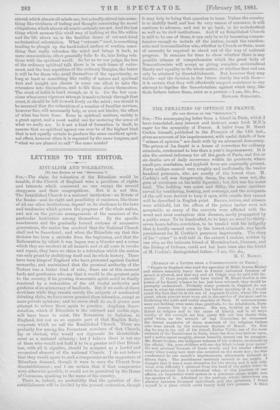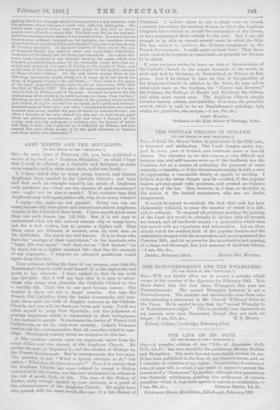THE PENALTIES OF OPINION IN FRANCE.
[TO VIE EDITOR OF THE “SFECTIITOR.”]
SIR,—The accompanying letter from a friend in Paris, which I have translated, may interest and instruct some Irish M.P.'s- eager for the sympathy of France. A letter from M. Henri Cochin himself, published in the Frar9ais of the 14th 'inst.,
gives an account of his imprisonment, with useful details of how "crimes of opinion" are dealt with by an advanced democracy.. The prison of La Sant d is a house of correction for ordinary criminals, condemned to less than a year's imprisonment. It is also the central infirmary for all the gaols of Paris, and five or six deaths are of daily occurrence within its precincts, where small-pox, scarlatina, and typhoid fever are constantly present.. Forty soldiers control very roughly and inefficiently the twelve hundred prisoners, who are mostly of the lowest class. M.. Cochin's cell was dangerously damp, the walls were wet, the gum of envelopes on his table liquefied ; but dirt was his worst trial. The bedding was scant and filthy, the same aperture served for ventilating, heating, and sewerage, and the occupants of the cell were desired to keep it open, with results that cannot well be described in English print. Razors, knives, and scissors
were withheld, but the offices of the prison barber were not acceptable, as many of the convicts were afflicted with the worst and most contagious skin diseases, easily propagated by a public razor. To be handcuffed, to be kept an secret for thirty- seven hours before conviction, to be treated with the indignity
that is hardly earned even by the lowest criminals, was harsh punishment for M. Cochin's generous impetuosity. The story of his " crime" is well told in the extract I enclose, written by one who, as the intimate friend of Montalenthert, Ozanaro, and the Bishop of Orleans, could not but have been also the friend of M. Cochiu'e distinguished fa.ther.—I am, Sir, &c., M. C. Bisnor.
[EXTRACT OF A LETTER FROM A CORRESPONDENT IN PARIS.] "People in England who read the speeches of Mdlle. Louise Michel
and others naturally fancy that in France unlimited freedom of speech is allowed, and that any and all things may be said with im- punity. If those people could have visited M. Henri Cochin in the prison of La So.nt6, whence be has just been released, they would be promptly undeceived. Probably many persons in England do not know in what his crime consisted, but before speaking of it, I would recall the fact that he is the son of Augustin Cochin, whose life was spent, whose powers were worn out in the service of the poor, and in furthering the noble and useful charities of Paris. If common-sense- were not lacking, even more than gratitude, to its inhabitants, Paris would honour hurt by a statue. His son, faithful OS was Lis, father to religion and to the cause of liberty, and in all ways, worthy of the example set him, justly felt not loss shame than grief when, on the seventh of last November, he witnessed' the forced expulsion of those members of the religious Orders- who were struck by the notorious decrees of March. On that day he was in the cell of his friend, Father Val*, one of the most eminent of the Dominicans in Paris, when the door was broken open,. and a police agent roughly, almost brutally, turned out its occupier. Mr. 'Henri Cochin, the indignant witness of his violence, exclaimed to' the official, Sir, your children will one Cloy blush to boar your name.* He was arrested because of these words, and for similar offences many other young men were also arrested on the same soy; he was condemned to one month's imprisonment, afterwards reduced to- fifteen days. The punishment certainly seemed to me ample. I thought that it was a more detention for two weeks, and it was only when with difficulty I obtained from the head of the police leave to visit the prisoner that I understood what, at this juncture of our affairs, an imprudent word spoken in a generous cause =Tilt cost the speaker of it. Admitted to the parlour, where interviews are allowed between favoured individuals and the prisoners, I found myself in a place which could barely hold two persons. A thick
grating faced me, through which I conversed for a few minutes with the prisoner, whose features I could with difficulty distinguish. His letters were opened before they were given to him, and no news- papers were allowed to reach him. The food sent for his use was sub- jected to a minute search before it was served to him. In a word, he was treated as an ordinary criminal, as, for instance, the murderer whose .crime has lately stirred all Paris, and who died in the same prison during M. Cochin's detention. In tho same quarter of Paris where the son of Augustin Cochin has suffered these and many other indignities, memories of his family are yet living and abundant. At a short dis- tance from his prison is the hospital bearing his name, which was founded a hundred years since by the venerable priest who then en- nobled and endeared the name of Cochin to the people of Paris, and -at the foot of the altar in the hospital chapel lie the mortal remains of Henri Cochin's father. On the slab which covers them is the following inscription, worth citing, for it sums up in few words the story of Augustin Cochin's life and death :—` Hero rests in tho peace of the Lord, Augustin Cochin, born the 8th of December, 1823, died the 19th of March, 1872. His whole life was consecrated to the ser- vice of God, of France, and of the poor: Crushed by sorrow for the misfortunes of his country, be could not survive them. Pray for him I' Kneeling on that slab, beside the mother of the prisoner whom we had Just visited, thoughts crowded on my mind, and a profound and inex- pressible sadness beset me,—not when I remembered him who rested beneath that stone, amidst the poor of whom he was the friend ; not when I thought of her who shared his life, and to heal whose grief there are precious consolations ; still loss when I thought of the young man who has undergone a sentence only the honour of which will cling to him ; but I grieved as I reflected on France, and con- trasted the men whom to-day it is her good pleasure to honour, and those whom she persecutes l"



































 Previous page
Previous page